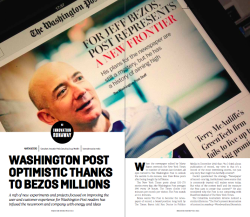 At times like this, when it seems the political world’s going to hell in a handbasket, it helps to take the long view.
At times like this, when it seems the political world’s going to hell in a handbasket, it helps to take the long view.
My life is infinitely more comfortable, and will likely be longer, than that of my parents or (especially) my grandparents. I have a large, air-conditioned house, next to a train that will get me to an Airport in under an hour and from which, for under $5,000 round-trip, I can travel to anywhere in the world.
The medicines I take prevented the heart attack that began claiming my father in his 40s. The miracles of our time saved my wife from cancer. The technology I began covering in its infancy, this Internet, has given us both fulfilling and independent careers. Our kids are taking this to the next level, studying ecology and the mechanics of life, so their children’s lives will be even richer than our own.
It’s especially important, at times like this, to understand American history and what drives our politics.
Business drives our politics.
The business of America is business.
The industry, or industries, that provide the most added-value to each generation inevitably winds up controlling our politics. What they do, in their own self-interest, is filtered through the actions of each generation into the genie we call progress.

What I’ve learned in my study of business and politics, going back to the start of this blog in 2006 but really decades before, to the start of my reporting career in the late 1970s, is that the needs and desires of our leading industry always drive the train.
There are days when this obvious truth comes up against what others consider genius and make me go ‘whoa.’ An example came recently in reading James MacGregor Burns’ three-part history of America, “The Vineyard of Liberty,” “The Workshop of Democracy,” and “The Crosswinds of Freedom.”

Here’s an example.
Burns sees the Progressive Movement of the early 20th century as an outlier, as something that appeared out of the ether, driven by lower-class desires for a better life, middle-class desires for liberty, and upper-class leaders tilting business to go along with it.
Bullcrap.
The progressive movement was a business movement. Having seen the inefficiency of the railroad model, business leaders like J.P. Morgan and John D. Rockefeller wanted rationalization, rationally-priced inputs, and mass markets to bring about their dream of the American city.
The city you live in was created in the progressive era. It is based on utilities. Gas utilities, water utilities, electric utilities, communication utilities, transportation utilities. Utilities provide social goods. That is, to secure the biggest market, and thus the biggest profit, utilities require a degree of order that had not been needed by business before.
Each industry found its own way to this order. Gas, electric, and telephony remained largely private, but regulated. In exchange for providing service to everyone, they negotiated rates of return with government and accepted the resulting social contracts. Water and transport were also private, at first, but quickly came under the control of government, because it was more efficient, and the resulting services were vital in the creation of other, more profitable industries, namely manufacturing. Rural areas were more likely to have co-operatives or government control for the same reason they were regulated in the cities – to conserve capital.

The utility model allowed manufacturing to develop, with assured supplies of needed inputs at the lowest possible price. The mass production of General Motors then needed the mass consumption of a growing consumer class. Manufacturers saw what would happen, absent demand, in the crucible of the Great Depression and World War II, surpluses left to rot or wasted in killing.
What confuses people today, beyond the fact they’re too busy looking down at their feet to see the larger trends of history and technology, is that the most recent generation of business, my generation in business, was dominated by the resource industries.
The Houston into which I entered reporting was an oil center. Money came out of the ground. It still does. If your well hits a deposit, an investment of a few million dollars becomes a prize worth billions of dollars. Suddenly your shit don’t stink. Every country, every society, that has found huge pools of oil has come to believe it justifies whatever it was they believed in before. This is something Saudi Arabia, Texas and even Norway have in common.
This is a top-down, mercantilist view. It brings prosperity to the people who control the resource. Everyone else must find some other way forward, under the thumb of the oil power. That power is enforced through armed might. We have a global military to control a global resource, and so believe that control is what undergirds our prosperity.

Problem is it’s an obsolete philosophy.
Today the cutting edge is defined by computing, and software. The gating factor is a ready supply of sharp, supple, trained, and hungry minds. Technologists don’t care about the package this talent comes in – color, sexuality, and physical condition are meaningless. If you’ve got the goods, if you can push out new algorithms, if you can make intellectual breakthroughs, if you can think new thoughts and improvise solutions based on those insights, you’re an oil well.

Amazon and Apple and Microsoft and Google, Adobe and Netflix, Intel and Micron, they aren’t going to abide a political and social system that exists to strangle human potential, that tells gay people they’re not fully human, that ignores people based on skin color or religion, or that tells women they must subordinate themselves to men. It’s wasteful. Seeing the alternative, they’re taking the lead themselves, and negotiating political solutions to that key problem, a desire for brains that can take the tools they have built and make new fortunes with them.
That’s the long view. That’s not just what I believe. It’s what I know, from a lifetime of studying business, history, and technology. The rest is details.

Look around, look around, at how wonderful it is to be alive right now.
Change is coming, and the past will soon be swept away. Because it’s just not competitive.










